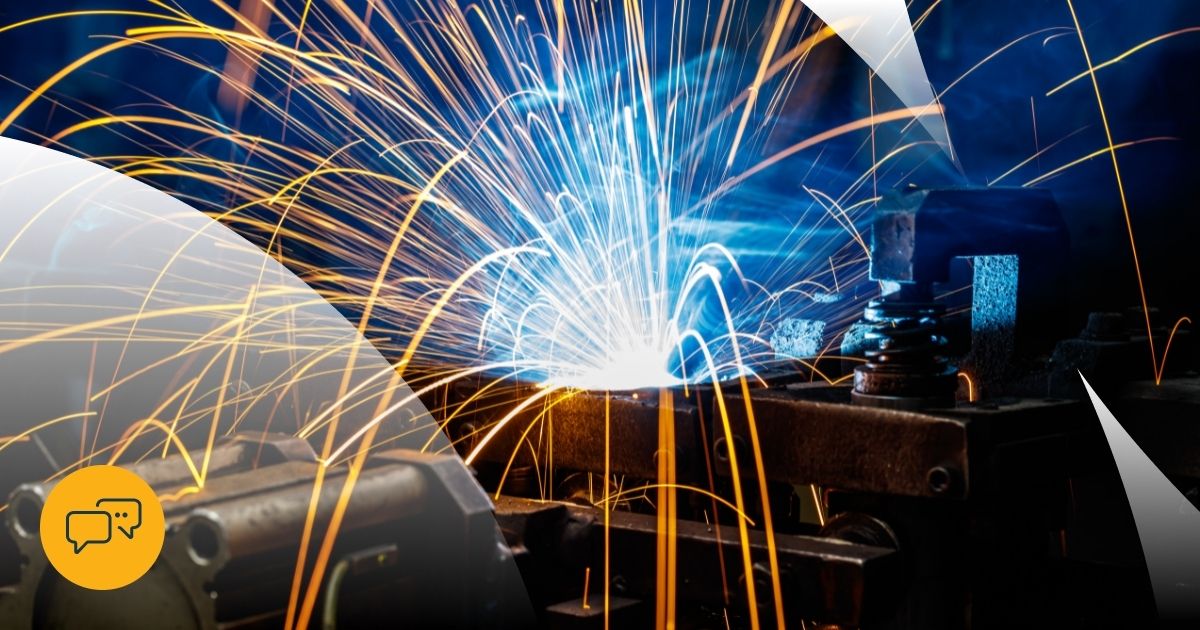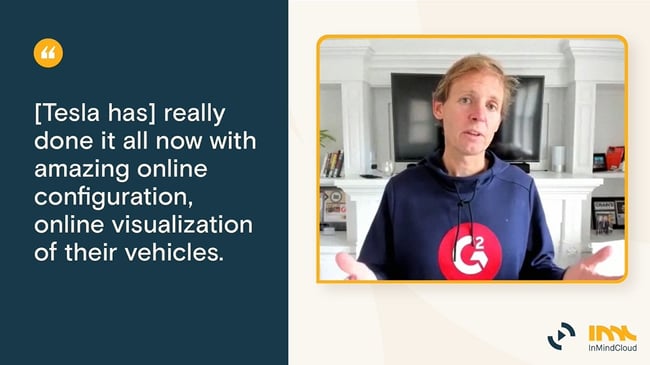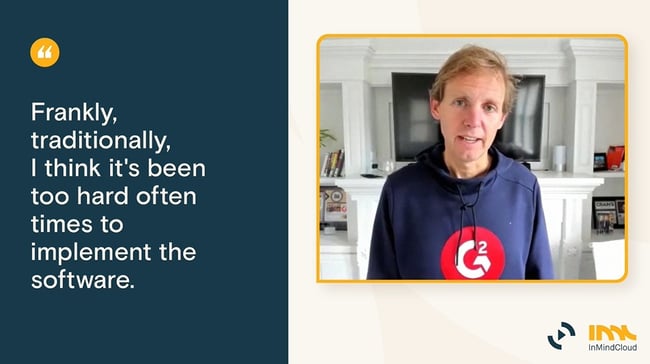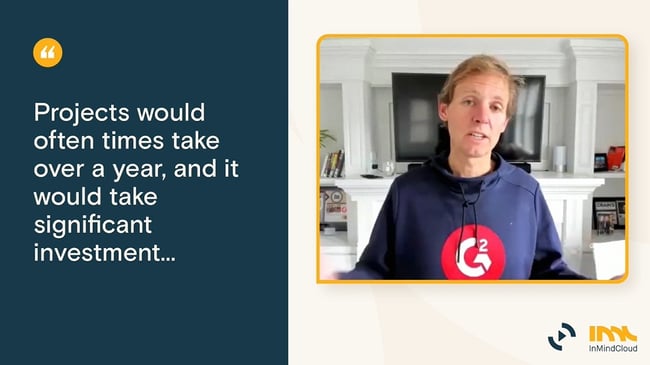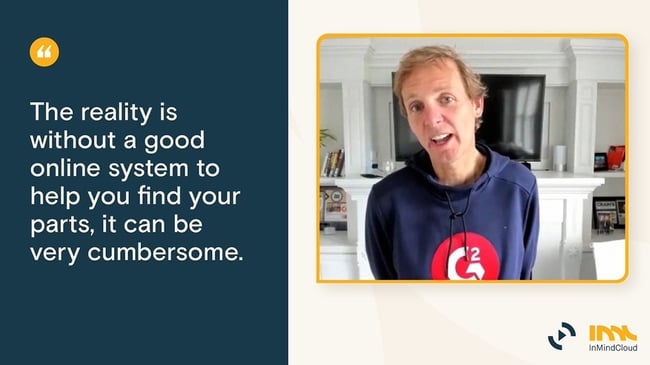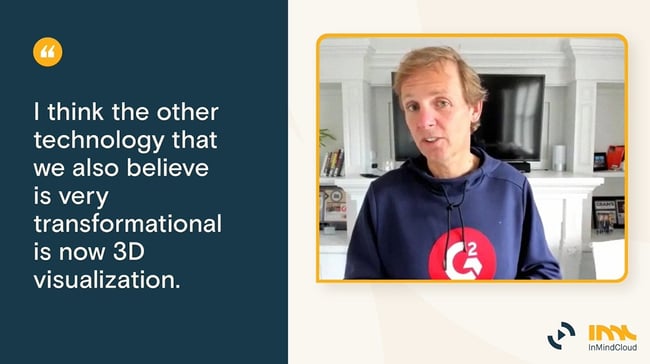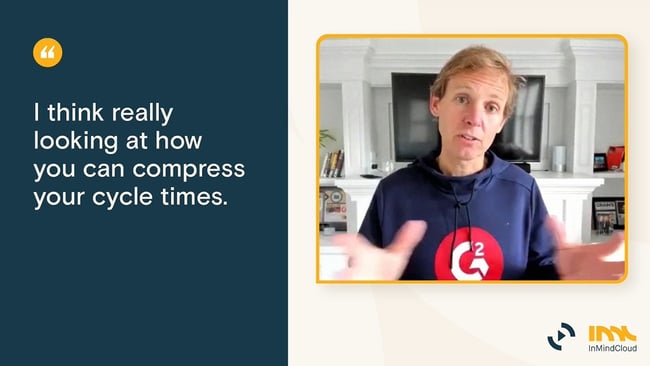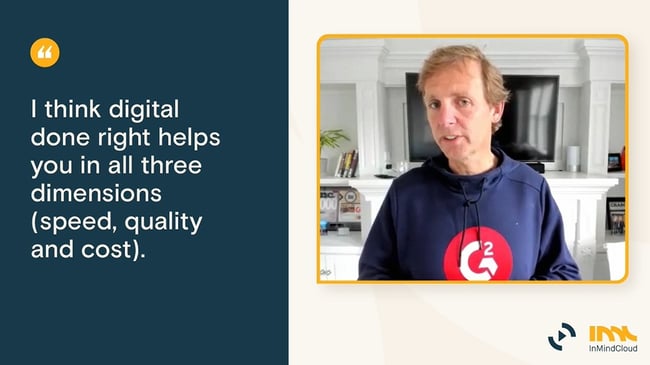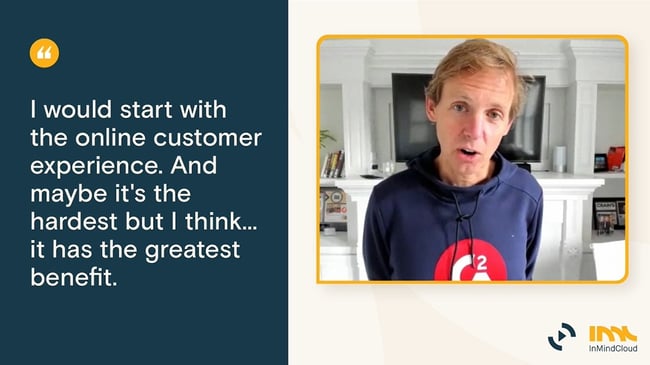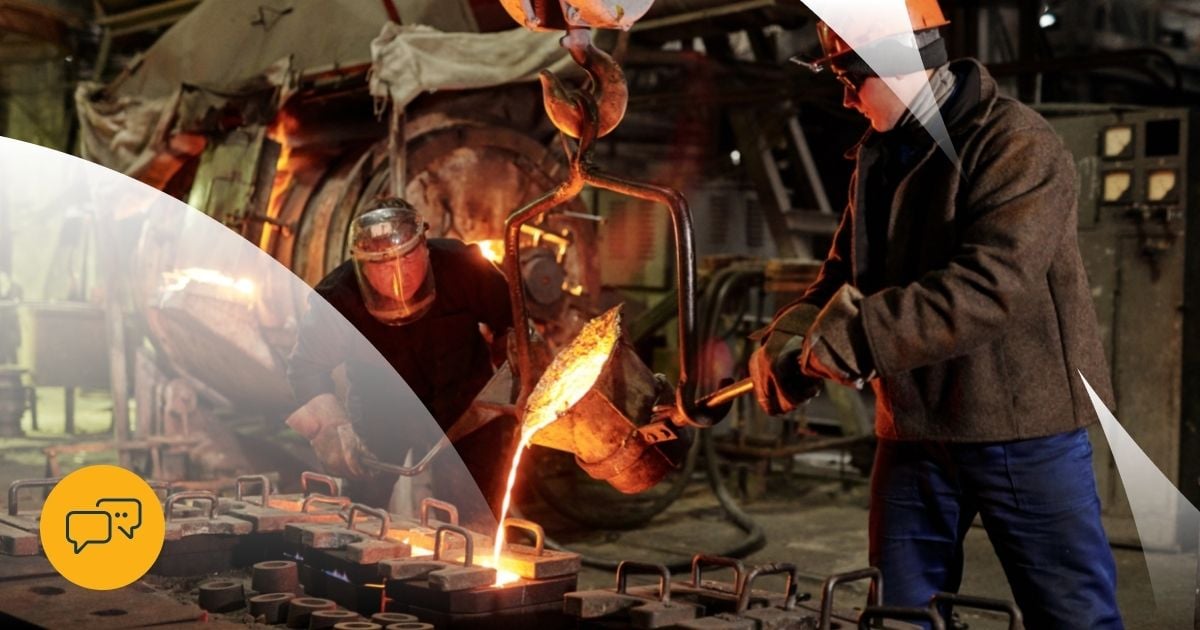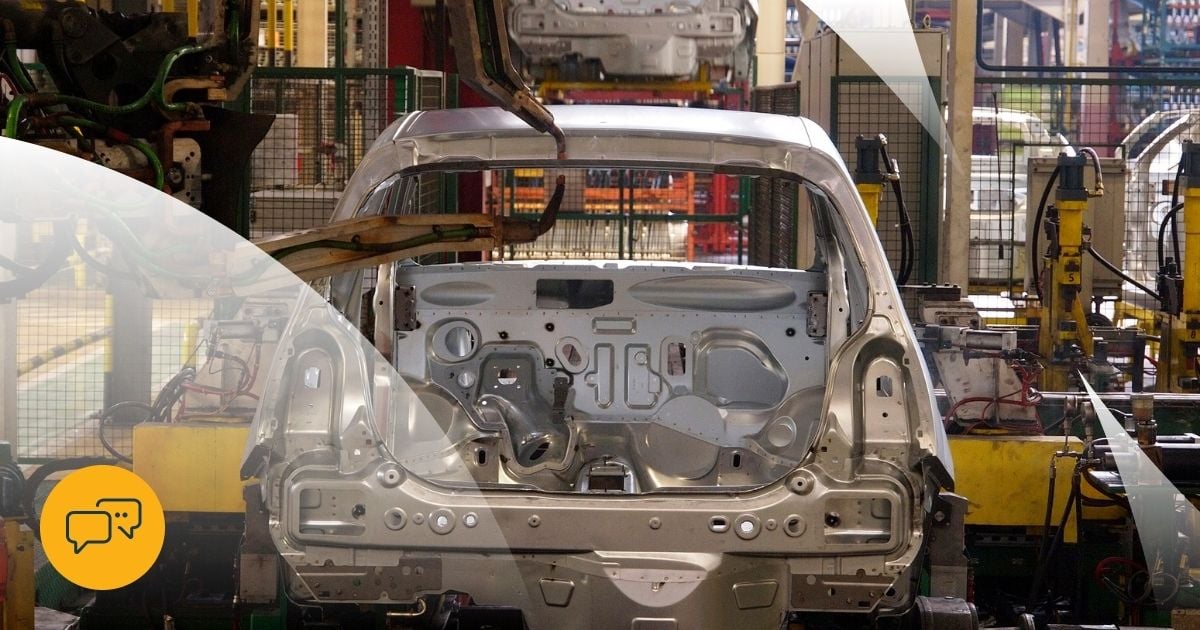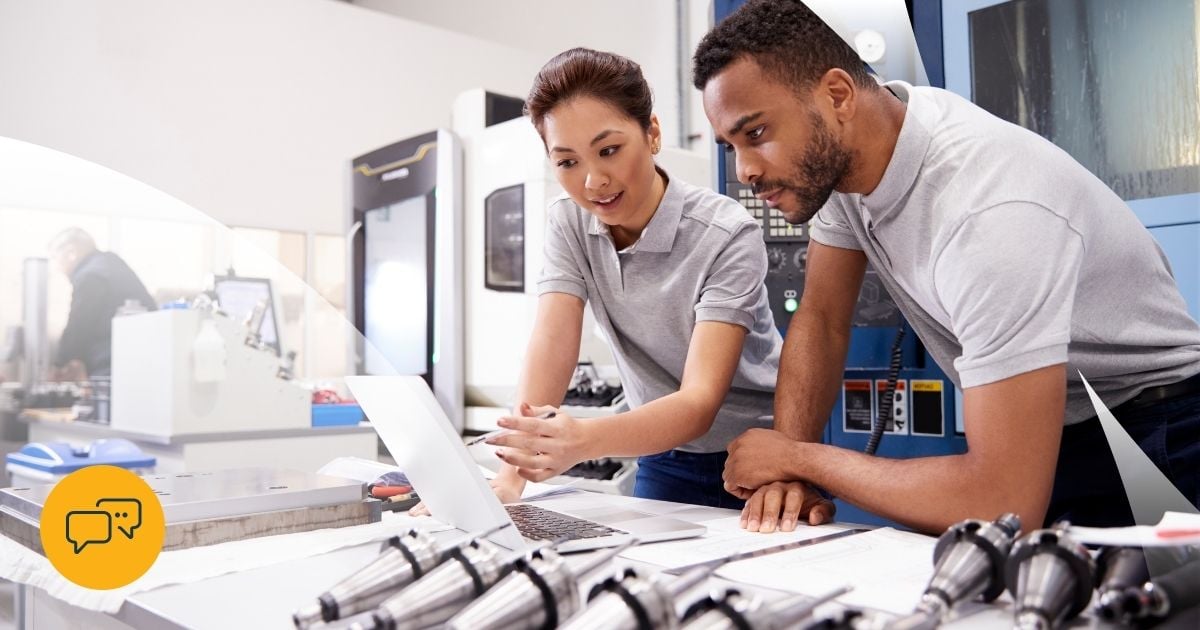"I've been in manufacturing my whole life, and I think digital, now, is really changing all aspects of it." - Godard Abel, co-founder, and CEO at G2
Episode Summary
Digital transformation of the manufacturing industry, or Industry 4.0, is a broad topic. It's mostly fronted by "hero" technologies like IIoT, AI, or robotics. But not many manufacturers are aware of the key and immediate role digital sales plays in their businesses.
In the simplest sense, digital sales is at the foundation of a manufacturer's transformation. But at the same time, it sits right at the customer-facing edge. So, what is digital sales really, and why is it so important?
To help answer this question, we invited Godard Abel to our Digital Sales Fireside to get his personal view on this topic. Godard Abel is currently the CEO and co-founder of G2, as well as the executive chairman of Threekit (an In Mind Cloud partner). A serial entrepreneur and an astute business leader, Godard also co-founded Big Machines (acquired by Oracle) and SteelBrick (acquired by Salesforce).
.jpg?width=600&name=Digital%20Sales%20Fireside_Godard%20Abel%20(1).jpg)
Watch the Digital Sales Fireside from 22/06/2021 to hear his thoughts on digital sales and its impact on the manufacturing industry.
The Recording
Episode Highlights
Digital is imperative for manufacturers in today's market
[01:08] - Digital, I think, is a huge trend. And I've been in manufacturing really my whole life. [When] I grew up, my father ran a German pump manufacturing company. So even in the summer, I remember sometimes working in his plant. So, I've been in manufacturing my whole life.
And I think digital now is really changing all aspects of it.
Certainly, I've always been on the sales side. And I think digital, especially selling products online, is becoming more and more the trend. And it's only been accelerated by COVID. The pandemic now over the past year has made it really hard for manufacturers or their distributors to visit their customers.
I think it was already the trend, and I know In Mind Cloud, you're all a big part of it, enabling manufacturers to sell and serve their customers online. So, it's really changing the front end—but not only the front end.
Most manufacturers now have global supply chains. They're sourcing their components from all over the world. And to communicate with their suppliers in real-time, they also really need digital. And so, it's really just changing every aspect of our industry.
Digital is changing manufacturers' business models
[02:30] - I think a great example is Tesla. Obviously, it's a car manufacturer. Not only do they disrupt the engines, going with electric vehicles and obviously making the world greener, but they also changed the whole distribution channel with digital.
And at least in the US, you know every other car manufacturer still sells their product through dealers. Local dealers that buy and resell the cars. And I think Tesla not only [manufacturers] electric vehicles, but they really have no dealers.
Almost all their cars are bought online. They have a few showrooms, where maybe you can look at the car. But they've really done it all now with amazing online configuration, and online visualization of their vehicles.
Start watching from this segment of the interview
I think that's been a big part of the disruption they're driving because it does allow them to be much closer to their customer. Because you buy directly from Tesla, so they also have a much more intimate relationship with you; they can service the car better.
We do have a Tesla Model X; you know, a great car. We got it a few years ago when it was first available. We're happy it makes the planet greener.
But we're also happy that now when we need service, [we] can just submit [the servicing request] online. And oftentimes, they would actually come to your house—because there's no dealer to go to.
I think that's just one great example of a manufacturer disrupting a whole industry with a very digital sales process that totally changed the sales and distribution channel.
Software challenges in the manufacturing industry
[04:29] - I have been in digital software [for] over 20 years, and frankly, traditionally, I think it's been too hard, oftentimes, to implement the software. I think everyone has digital visions.
Start watching from this segment of the interview
I think that people naturally see how they can better serve their customers, their distributors, their manufacturing reps around the world. Especially by [making] it easier to shop, configure, and customize the products online.
But the reality is it's actually really hard to implement those projects.
I remember my first company, Big Machines. And we called it big machines because we wanted to help manufacturers like my father's that sold the machines, sell them online. And frankly, we also underestimated the task.
Because I remember we thought we'd be able to, within one year, have the software ready. Really it took multiple years. Remember, in the early days, most manufacturers [with] these projects would oftentimes take over a year.
Start watching from this segment of the interview
It would take significant investment from their people, with the software vendors. That's traditionally been a challenge. Maybe it took too long to get quick payback, and that's [also] been one challenge.
But I will say the modern cloud was obviously making it much easier.
My last company SteelBrick, we were acquired by Salesforce. And obviously, they did that in traditional CRM customer relationship management where they moved it all online, [and] made it much easier to deploy than the older systems from Siebel and the original CRM systems.
And I think now the same thing is happening. [At] In Mind Cloud, you're driving that and really enabling integrated CPQ, channel sales, all online out of one package.
And so, I think it's getting easier and faster now to implement. That, really to me, is probably more the blocker than people not seeing the vision or the potential of the technology.
Finding the right digital solution for manufacturing businesses
[06:22] - That (difficulty in finding the right B2B IT solution) is actually why we started G2. Because my first company, Big Machines, we were selling software to manufacturers around the world. But frankly, we saw they had a really hard time discovering us.
One of our early customers was Rolls Royce. Not the car Rolls Royce, but their big turbine business in the United States. And I remember this was maybe 2009. I remember they finally found us somehow via Google search and what they told us.
They're like, "wow, we wish we found you three years ago because we've been trying to build a software in-house." And so, I think traditionally, it has been hard also for manufacturers to find the right software for their business. And that was really our vision for G2.
We wanted to make it more [like] shopping for business software. More like shopping on Amazon or on Tripadvisor, where you can easily discover the right software for your manufacturing business—and then you can also easily evaluate it.
And that was really our inspiration in the consumer world when we shop on Amazon. We all look at reviews to help us make faster buying decisions.
And we thought that was missing in our industry of business software, and so that's our inspiration for starting G2. The reality is, without a good online system to help you find your parts, it can be very cumbersome.
Start watching from this segment of the interview
I remember that my father's business, as I mentioned, [was a] small pump company. But they still had all the file drawers with drawings at the factory that was in Buchen, Germany, somewhere east of Hamburg. And literally, that was the only place in the world the information was.
So the customer would either fax or call an inquiry from anywhere in the world, and somebody would have to go look in the file system and figure out, "oh, this membrane blew out on my pump; which part number do you need."
And obviously, as German business, they were good at keeping other paper files. The records were perfect, but the customer couldn't access them without calling the factory or going through the manufacturer's rep. I think that's frustrating for the customer.
If you have a critical outage, it might take a couple of days until the manufacturer would get back to you. And also, for the manufacturer, [it] was cumbersome because you had to have highly qualified technical workers manually looking through papers trying to figure out the right part.
And I do think that now it's starting to happen. You make it (business knowledge) all available online.
Start watching from this segment of the interview
And I think the other technology that we also believe is very transformational is now 3D visualization. I'm also involved in the company Threekit.
But whether it's Threekit or another 3D technology, now you can not only have the bill of materials, reference drawings, and explosion drawings online, but you can even have an interactive 3D experience where you can see your pump in 3D.
Maybe in a virtual sense, remove the cover, and then you'll see what membrane you need. And you can embed digital hot spots. So now, in real-time, you can immediately find the part online, and with a couple of clicks, be able to order the right part.
And then I think it doesn't end there. So, the order can now flow digitally into the ERP [and] into the fulfillment system. And if you also have a very digital supply chain, maybe [the order] goes right to a third-party manufacturer or distributor that's near the customer, [who] can ship it in real-time.
One very cool trend—there's also a start-up in the US, even adding 3D manufacturing or 3D printing to that. They've partnered with a distribution center in Memphis. I think it's right by FedEx.
You can digitally order the part, but then rather than having to have a massive inventory, they can use 3D printing or 3D manufacturing technology, CNC, or however you make the part, make it in real-time right next to FedEx, and then it shows up in any factory lease in North America within hours.
And I think that's really the end-to-end digital potential even in terms of how you build the product in real-time based on a digital file.
Digital's impact on the future of your manufacturing firm
[10:50] - Well, like we're just talking about spare parts. But certainly, I think also cycle time on the front end. How long does it take from the time the customer knows [which] part until they actually receive the part that they need and have it installed in their machine.
That would be kind of an end-to-end. Then you can break down your cycle time throughout the whole process. You can look at your inquiry order; how long does it take from initial customer inquiry to convert that into an accurate order. But then you also know how long it takes to fulfill that order or shift that order.
Start watching from this segment of the interview
And so, really looking at how you can compress your cycle times. Now, most companies also have lean manufacturing. Which means most manufacturers have less inventory. But it also means their customers have less inventory.
So they're really expecting that speed—both speed and accuracy. In manufacturing, there's always speed, there's quality, and then there's cost. And I do think digital done right helps you in all three dimensions.
Start watching from this segment of the interview
Because as we talked about the spare parts ordering. If you have 3D, the customer can see for themselves. They're going to get the right part, so there won't be an error.
So now you have high quality (error-free manufacturing), it could also be speed because the customer can do it in real-time. The order can digitally flow to the manufacturer on the supply chain, and it's much more cost-efficient.
Because you no longer have expensive technical workers spending hours processing the order, or finding the part, entering the order and ERP system, calling and faxing to the supplier.
All of those traditional, well in Germany you'd say "Sachbearbeiter," (in English: administrator) but you know all the people that are traditionally involved in that process can really—if you set up your digital right—[automate their work]. All of that manual work can be eliminated.
Which means the customers get [what they need] in real-time. So you have speed, it's accurate, so you have quality, and there's really no cost. Because all the work is being done, [or] automated digitally. So I do think that's why it is so exciting for a customer [or] for manufacturers.
Because you can really win all three dimensions if you do digital right.
Start digitalization with customer experience in mind
Start watching from this segment of the interview
[13:14] - Well, I would start with the online customer experience. And maybe it's the hardest, but I think as we just described in the order of the spare parts, I think it has the greatest benefit to the customer. Because they can self-serve in real-time, 24/7.
For the manufacturer, it ultimately has the greatest benefit in terms of speed, cost, and quality.
That's what I mentioned with Tesla, right? That's what Tesla did with car orders. They just went all the way, where now, if you go to the Tesla website, you have an amazing online customer experience.
It brings you closer to the brand, and frankly, then you don't even need sales [doing traditional work] if the customer can just order online. And that's why I think that's the most disruptive and [has] the biggest potential.
We hope you enjoyed watching our Digital Sales Fireside chat with Godard Abel. We have more insightful interviews lined up in the near future, so make sure you sign up to receive an exclusive invite for our next Digital Sales Fireside.

 Deutsch
Deutsch

